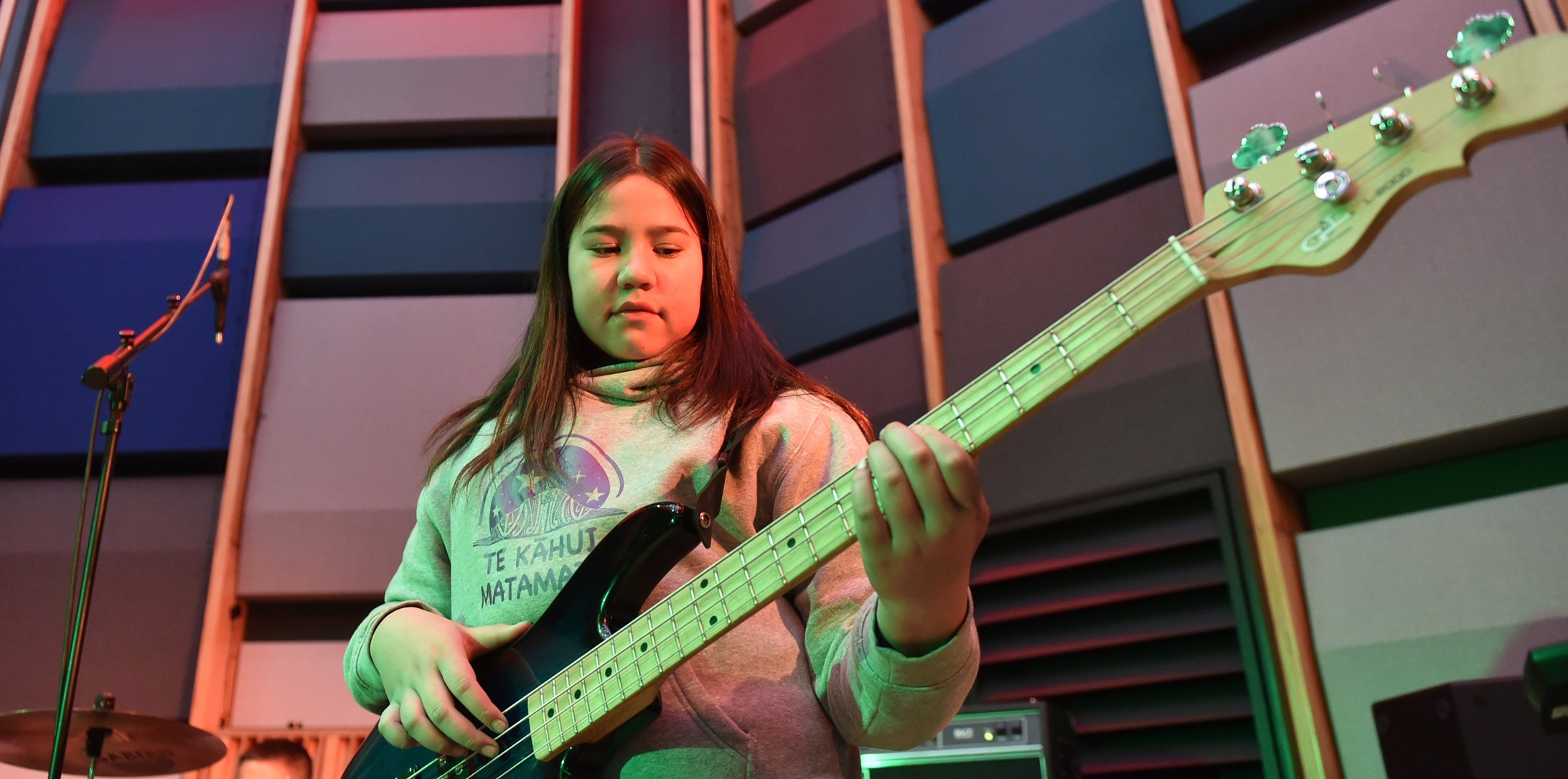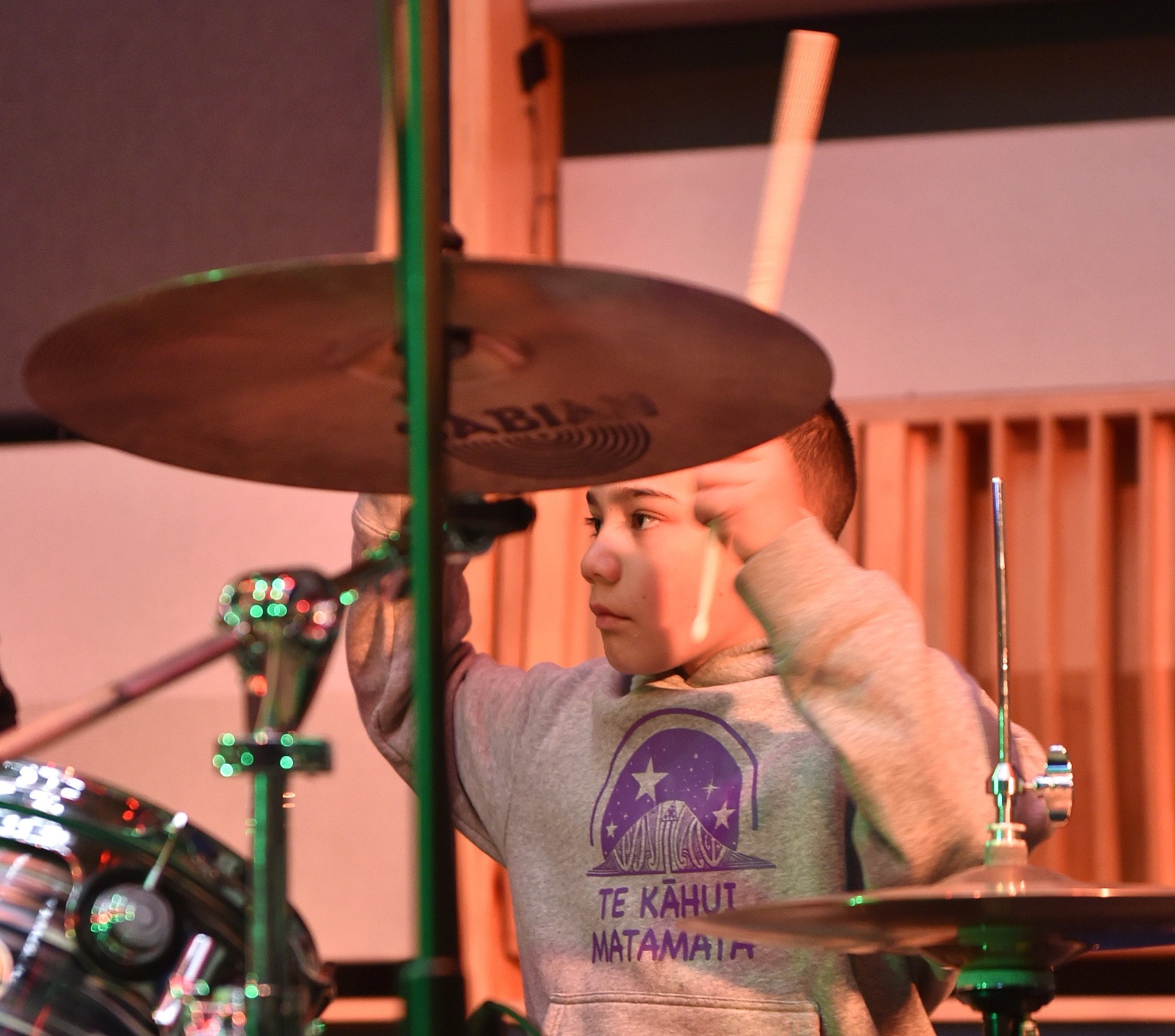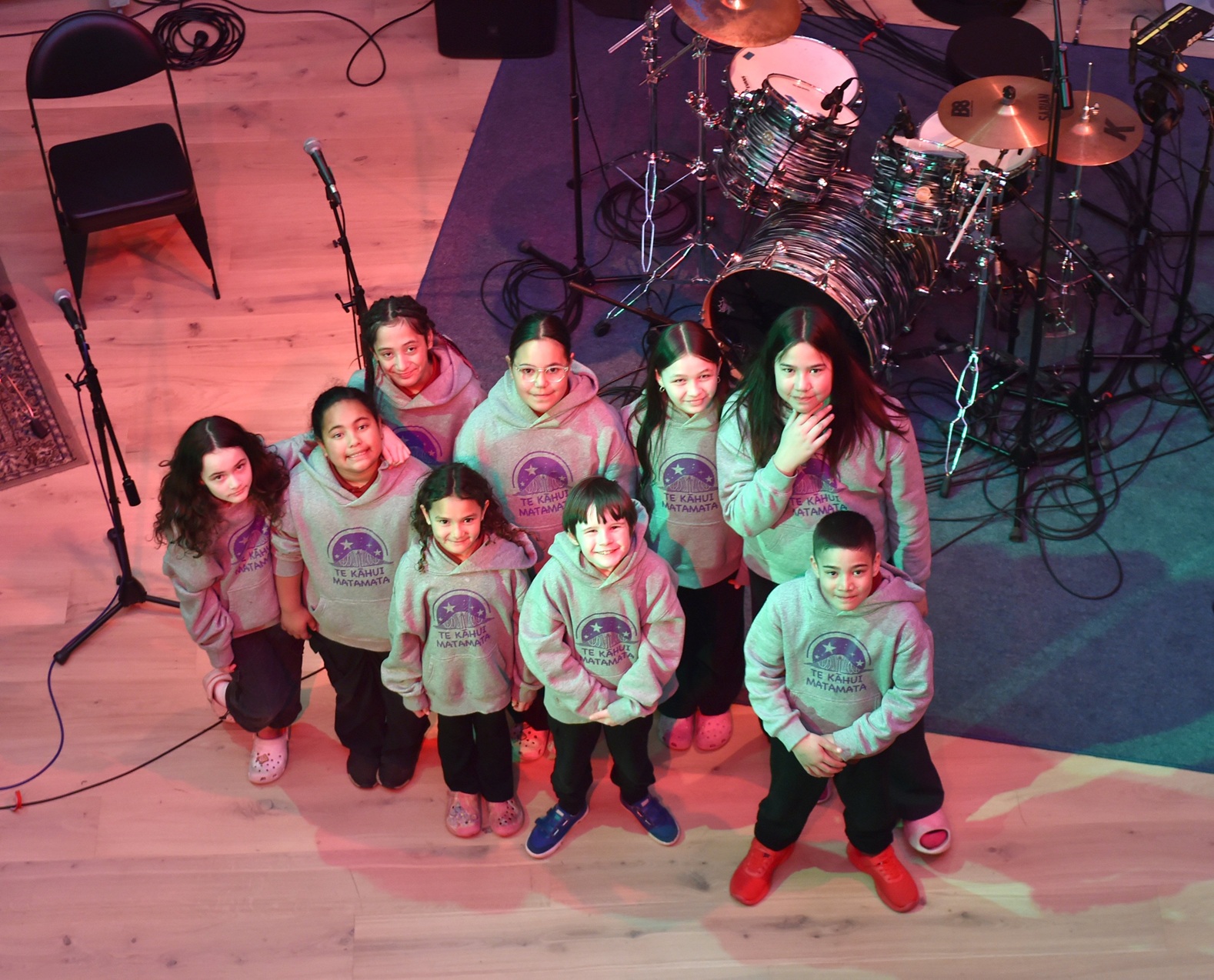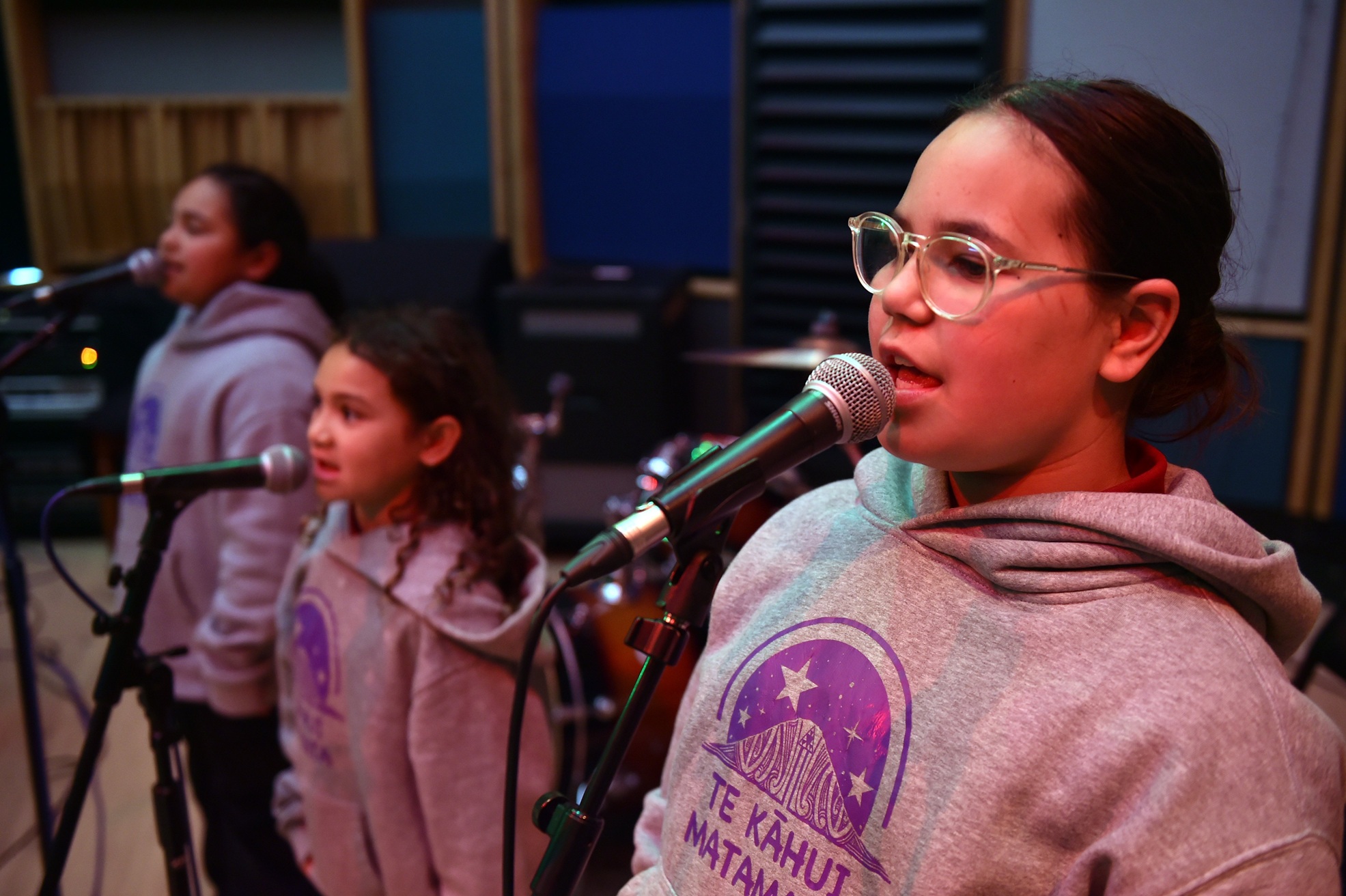
The call rises from the floor of Te Korokoro o te Tūī, the towering temple to sound that is the University of Otago’s Union St East recording studio.
"Maranga ake ai," the band from Te Kura Kaupapa Māori o Ōtepoti sings, in a new take on some classic Kiwi roots reggae. And here in this room with its head in the clouds, their words ring clear and strong.
The young band — ages 8 to 11 — stand in a circle on the studio floor, facing one another, listening and leaning into the music, their tutor, guide and roadie Hiliako Iaheto moving quickly between them, adjusting a dial, keeping the beat.
It can be tricky, reggae, the syncopation, the emphasis on two and four. But the band, Te Kāhui Matamata, are on it, they’ve been practising hard for this occasion.
Later, estimates will vary about just how many times they had to play Maranga Ake Ai during their extended recording session, to capture the best of everyone’s performance.
Someone suggests 90, which seems a little high. But then they also presented the song at Bandquest earlier in the year, so taken altogether, maybe an argument can be made. Ninety times through to lay down the definitive version.
Practices stretched over about two months, someone else says. Well, two months or too much, one or the other. Whichever was the case, it was well worth it.
In behind the drum kit somewhere, not much of him showing, Jake Arbuckle is keeping things steady. Sister Aiyla-May Arbuckle has the bassline locked down, and the bassist’s nonchalance down pat.
Iaheto says they have the potential to become a rhythm section to be reckoned with.
Over on the Fender Bullet, Eli Duff-Cairns’ staccato style speaks directly to the tradition. Iaheto has big wraps on him too.
True to the original version of the song, by ’80s Pacific reggae pioneers Aotearoa, the pace is easy, mirroring the hīkoi it sings about.
As penned back in the day by Joe Williams, now Sir Joe Williams (KNZM), Justice of the Supreme Court, the first verse runs:
"There’s a movement, a movement on the street
People moving, they shuffle to the beat
I hear them talking, talking on the street

'Cause that’s what my people need."
Then Te Kāhui Matamata hits the chorus and the combined voices of Ava-Rome Kake, Whakaara Nyman-Rakete and Whetu-Marama Te Amo send the song skywards, their harmonies climbing, climbing.
But while the melody is familiar, there’s also something different going on here, because this is a kura kaupapa Māori band.
"Actually, we started in English and then Whaea Marcia came, because she was super angry that we were singing in English," one of the band members recalls of an early run through.
"I was not super angry," Whaea Marcia corrects the record. "Why should we be singing it in te reo Māori?" she asks.
"Because we’re Te Kura Kaupapa Māori o Ōtepoti," comes the answer.
Whaea Marcia is happy with that.
The story is that Whaea Marcia Cassidy called in a little help, in the form of noted local language expert Komene Cassidy, who, with his son Kiringāua, translated those parts of the song not already in te reo Māori, and the band — bilingual all — changed feet.
So, it was the all te reo Māori version they presented at Bandquest and they’re recording now, a first for the song — with Williams’ blessing.
What are the band’s favourite lyrics, she asks.
"Matika, maranga" and "matika, hīkina" are a couple of suggestions. A bit like Bob Marley’s "get up, stand up", Cassidy says by way of translation.
"Ūpoko pakaru te karawhiu," also gets a vote. That’s like "go for it".
The recording’s in Auckland now, being mastered at Kog Studio, ahead of its release.
All in all, then, much to celebrate about the young band’s efforts. Stickman Jake Arbuckle also picked up a Rocking Drummer Award at Bandquest.
It is testament too to the determination of the kura to extend all possible opportunities to its pupils.

"There's a high teacher shortage, there's an even higher teacher shortage for teachers with te reo Māori, and then you've got to have these other skills as well, like being a music teacher.
"So, we didn't have anybody, and I recognised that actually our curriculum, maybe, was a little too academic focused, and I was, like, our kids need some creative outlet."
It wasn’t as if their pupils had no outlets for creative expression, there was kapa haka for example, but Te Aho Matua, the guiding document for kura kaupapa Māori, talks about nurturing the talents of each child.
So, they brought in art and music classes, the latter led by Iaheto.
In the course of those programmes they’ve seen new aspects of their children blossom and grow.
"It really has opened up the world for some of them," Cassidy says.
The child who was previously drumming on tables and chairs can now put that proclivity in its proper context.
It’s precisely the sort of outcome Iaheto hopes for.
"We just want to create and provide spaces for them to explore, that they would probably not otherwise experience," he says. "Because I believe that the arts does make a difference, you know ... just in terms of wellbeing."
Over the years he’s seen any number of children, some of them struggling with life or school, find something in themselves when they’ve been handed a set of drumsticks or a guitar. One in particular, a "rough diamond" he was asked to work with at another school, went on to make quite a name for himself, picking up serial awards for muscianship at school band competitions, he recalls.
"For him, I felt that for him, in his struggles, in his home life, or whatever the case may be, music was what got him through."
But children don’t need to experience some sort of headlining achievement to get something out of it, he says.
Learning a simple beat on the drums can open their eyes to the idea of their own potential.
"Once they achieve that, once they get to that, ‘oh, I can play the beat’, you see the lift in their eyes, their smiles, it’s building their confidence."
And for those who fret about the three Rs, Hiliako sees benefits there too.

"OK, so when you're playing your groove, use that. You know, say, ‘how many beats are there?’. And it's, ‘there are four beats in one bar — use that’. Times how many times? By two? Well, how many bars? Oh, two. Done."
All this creativity also seems to spill out across a school in other ways.
Hiliako has also been working with pupils at Concord School, in classroom-sized classes, in small groups and putting together the school band, Plug In.
At one point he called in roving fine arts practitioner and educator Janet de Wagt to help out — and now the band has it’s own T-shirt design.
There were a couple of students in particular who had exhibited a flair for art and design, he says.
"So, when Janet came, you know, ‘you guys go to hang out with Janet’. And that was their thing — while I was hanging out with musos."
Other children threw themselves into marketing roles for the band’s shows.
The speed with which all this comes together is astonishing. Just as at the kura, Concord School’s band is the work of just a few terms from pretty close to a standing start.
One or two of Plug In’s members admit to some other extracurricular music lessons, but most of it has happened right there at the school.
The commitment now is solid, especially when it comes to the performances.
"It's normally, like, on a Saturday, so instead of just being at home and doing nothing, I get to hang out with Plug In," vocalist Sierra Ford says.
Principal Glen Beadle is a witness to all this.
"They're coming to school early, getting ready, setting themselves up, practising. Lunch times as well, so it's all driven by the students," he says.
"And the number of students now who want to work towards being in our school band is quite amazing. The hands that go up of those who want to be in the band when they are seniors is quite cool, so something for the younger ones to strive for."
Plug In performances have included the Greater Green Island Get Together — for which a school board member answered an SOS to stand in on the bass — and rest-home tours. There’s another rest-home tour planned this term.
They have been known to bring tears to the eyes of those listening — in a good way.

In the example of the rest-home tour, it’s the school band taking what they’ve learned — which in Plug In’s case includes the always popular Country Roads alongside Marley earworm Three Little Birds — out into the surrounding suburbs. But there’s movement in the opposite direction too.
Iaheto tells the story of a couple of drum kits.
The first was rescued from a skip and passed on via friends — Iaheto’s network is extensive.
"Buff it up, put on new skins ... and this is a working kit," he says.
The second was donated by a local member of the judiciary.
"Well, this was their brother's. And the kit was bought in the ’70s."
It’s a Pearl kit and would have been a statement back in its day, he says. So, that was restored too and now sits at Concord School, one of two kits there now.
Two kits are handy when teaching.
Before Iaheto started coming in, Concord taught percussion with plastic bins and pool noodles. They’ve graduated to proper drum sticks now, on those same plastic bins. But as they work their way through a lesson, the children now rotate through the drums kits, everyone taking a turn, and clearly relishing the chance to unleash a little of their inner Tom Larkin.
"So we've gone from having just the pool noodles as our drumsticks to having a whole music room now with a couple of sets of drums, the electric guitars, the bass, an amp set," deputy principal Wendy Ross says.
There’s been fundraising.
Families catch on pretty quickly too, when their children are this keen. The dummer in the kura band now has his own kit.
"That's how they wake up the kids in the mornings now, dad's on the drums," Cassidy says of the family.
She is keen to keep the momentum going at the kura, though it sounds like it would be difficult now to stop it.
"Some of the other tamariki have seen what is possible, now everybody wants a band — so I think Hiliako's got his work cut out for him."
Some of the senior students at the kura also picked up a prize for their original composition at Tangata Beats last year.

All this is music to the ears of Andrea Robertson, a primary programme co-ordinator at the University of Otago’s College Of Education Te Kura Ākau Taitoka, and a teacher of many years experience with particular expertise in music.
Now she helps turn out teachers equipped to deliver music in the nation’s classrooms.
A lot of Dunedin’s schools are doing similar work to Concord and the kura supporting music in the classroom, she says, but she acknowledges the difficulties they face.
Primary school teachers are generalists, she says, so may or may not have expertise in music, and providing the physical resources to teach music can also be a stretch for schools. But there are so many benefits in teaching music and the arts, from health and wellbeing to the huge role the creative arts play in the New Zealand economy, she says.
Robertson has a concern that’s being put at risk by the new draft arts curriculum for mainstream primary schools, which recommends just one hour a week across music, art, dance and drama. That’s just 15 minutes a week for music — carrying an attendant risk that funding will be cut for that area.
"So that's going to be tough for teachers."
All these curriculum areas are being squeezed — alongside the social sciences, science and technology, health and PE — as the government mandates other emphases, she says, such as an hour a day each of maths, reading and writing.
"So all those other curriculum areas at the moment, last year and this year, I would say are really taking a battering — because how do you fit it all in?"
It undermines the ability of teachers to integrate the creativity, problem solving and literacy that these other learning areas bring.
Back at Te Korokoro o te Tūī, the kura kids are thinking about what they will take away from their experience in the band, Te Kāhui Matamata.
"To listen to each other," someone suggests.
"And believe in yourself."
"Stick together. Never give up."
And, of course, they’ve also now learned that there’s a pretty cool recording studio with some astonishing equipment down at the local university.
Iaheto is hoping they hang on to that piece of information.
"Hopefully, one day maybe, they would be inspired enough to go to Otago University and explore performing arts — whatever that would be. We can only provide space."














